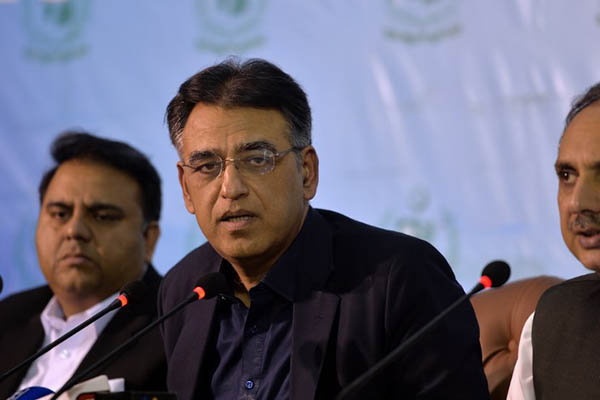
File photo. Aamir Qureshi—AFP
Planning minister claims to media current strategy is a ‘balanced’ decision, as country reports over 6,500 cases of virus
Defending the federal government’s decision to ease lockdowns designed to curb the spread of the novel coronavirus, Planning Minister Asad Umar on Wednesday claimed it was a ‘balanced’ move that factored in ground realities of Pakistan as a developing nation.
“No one including Prime Minister Imran Khan wanted to take a decision that had health implications, but sometimes difficult decisions are made even on issues related to public health,” he told journalists a day after the movement restrictions were eased despite reservations by the Sindh government that it would result in a spike in COVID-19 cases.
Over 200 confirmed cases of the coronavirus were reported between the government announcing the easing and Wednesday’s press conference. More than 500 new cases have emerged in the past day. Pakistan’s death toll has also risen to 124.
Justifying P.M. Khan’s decision to allow reopening of some industries, including construction, Umar reiterated the government’s claims that this was the only way to ensure daily wagers did not die of hunger without any source of employment. “Those who had saved money for the wedding of their daughters may have survived by consuming that amount but they would be left with nothing for the weddings; same was the case with those who had saving for the education of their children,” he claimed, without offering any details on where he had obtained this information.
According to Umar, the government has distributed Rs. 35 billion among more than 2.86 million families under the Ehsaas Emergency Cash Program, adding a total of Rs. 144 billion has been allocated for the financial assistance of 12 million families.
The minister said that some critics of the government’s policy had wanted a united front against the virus, but he—and the prime minister—believed that provinces and even districts should act as per their requirements. “Think globally, and act locally. Difference of opinion is obvious even in central government of the U.S., governors and states,” he said, without making any mention of the great criticism directed toward U.S. officials who have come out against the lockdowns at this stage.
Also on Wednesday, Special Assistant to the P.M. on Health Dr. Zafar Mirza said guidelines had been drawn up for exempted industries to ensure that all employees remain protected and prevent local transmission of COVID-19. He claimed the total number of confirmed cases in the country was almost three times lesser than the number forecast by predictive modeling.
“Till date over 18,000 cases should have been reported, but there are only 6,000,” he said. He did not mention how much testing was required to fulfill the modeling requirements. Pakistan continues to have dangerously low testing rates, having thus far tested less than 75,000 people nationwide in a country of 220 million.
Special Assistant to the P.M. on National Security Moeed Yusuf, meanwhile, said the government would increase the number of stranded Pakistanis being brought back to Pakistan via special flights to 7,000 from the current 2,000. “Earlier all flights were being operated from- and to- the Islamabad International Airport, but now six airports have been opened for the purpose across the country,” he said.
